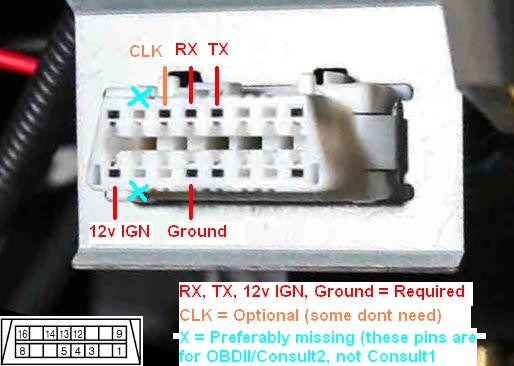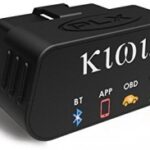Navigating the world of automotive diagnostics can be tricky, especially when you encounter unexpected roadblocks. Many Nissan owners have experienced confusion when their vehicle, despite having an OBD-style port, fails to communicate with standard OBD2 scanners. This issue often arises in older Nissan models, leading owners to wonder why their off-the-shelf diagnostic tools aren’t working. The likely culprit? Your Nissan might be using a Consult port disguised as an OBD2.
Understanding Nissan Consult and OBD2 Confusion
Nissan Consult is a proprietary diagnostic protocol developed by Nissan long before OBD2 became the industry standard. To simplify physical connections, Nissan sometimes implemented the Consult protocol using the same 16-pin connector shape as OBD2. This is where the confusion starts. While the port looks like a standard OBD2 port, it speaks a different language – the Nissan Consult protocol. Therefore, generic OBD2 scanners, designed to read standardized protocols, cannot communicate with these Nissan ECUs.
 Nissan Consult port likely using OBD style port
Nissan Consult port likely using OBD style port
Why Doesn’t My OBD2 Scanner Work?
If you’ve plugged in a generic OBD2 scanner into your Nissan and it failed to connect, it’s highly probable your vehicle utilizes the Nissan Consult protocol through an OBD2-style port. Standard OBD2 readers are built to interpret protocols like CAN, ISO9141, PWM, and VPW. They are not equipped to understand Nissan Consult. Think of it like trying to speak English to someone who only understands Japanese – the physical connection might be there, but the communication will fail due to incompatible languages.
Exploring Your Diagnostic Options
So, what can you do if you suspect your Nissan has a Consult port disguised as OBD2? Thankfully, you have several options to effectively diagnose your vehicle:
1. ECUTalk Cables: A Dedicated Solution
For Nissan vehicles employing Consult protocol within an OBD2 port, specialized cables like the ECUTalk USB cable are designed to bridge the communication gap. These cables are engineered to translate the Consult protocol into a format your computer can understand via a USB connection. While effective, they can be a more expensive option, especially if you only work on Nissan vehicles occasionally. It’s crucial to confirm compatibility with your specific Nissan model and engine type before purchasing an ECUTalk cable.
2. Consult-Compatible Scanners: Speak the Right Language
Another approach is to invest in a diagnostic scanner specifically designed to read the Nissan Consult protocol. These scanners are programmed to understand Nissan’s proprietary language, allowing you to read fault codes, perform relearning procedures, and monitor live data. Some of these scanners might also offer OBD2 compatibility, making them versatile tools if you work on various makes and models.
3. CANBUS Compatibility: A Potential Misconception
You might have encountered information suggesting that a CANBUS-compatible OBD2 reader might work with Nissan Consult. While some later Nissan models transitioned to CANBUS-based OBD2 systems, vehicles using Consult protocol through an OBD2 port are generally not CANBUS-based in their diagnostic communication. Therefore, simply having a CANBUS-compatible OBD2 reader is unlikely to solve the Consult protocol issue.
4. Adapters: Pin-Out and Protocol Considerations
The idea of using an adapter to “convert” the signals might seem appealing. However, the issue isn’t just about the pin layout of the port; it’s fundamentally about the communication protocol. An adapter that merely changes the pin configuration won’t magically make a standard OBD2 reader understand the Consult protocol. The core problem lies in the incompatible communication languages, not just the physical connector.
Finding Cost-Effective Solutions
The original forum post mentioned concerns about the cost of solutions like ECUTalk cables. While dedicated tools can be an investment, it’s worth researching if any more affordable, Consult-compatible scanners have emerged in the market since the original query. Online marketplaces and automotive diagnostic retailers are good places to search for potentially cheaper alternatives. Reading reviews and verifying compatibility with your Nissan model is crucial before making a purchase.
Conclusion: Choose the Right Tool for Nissan Diagnostics
Diagnosing a Nissan with a Consult port disguised as OBD2 requires understanding the nuances of Nissan’s diagnostic systems. While a standard OBD2 scanner won’t work, dedicated tools like ECUTalk cables or Consult-compatible scanners provide effective solutions. By identifying the correct protocol and choosing the appropriate diagnostic tool, you can successfully troubleshoot your Nissan and keep it running smoothly. Remember to always verify compatibility with your specific vehicle model and engine type to ensure accurate and reliable diagnostics.
